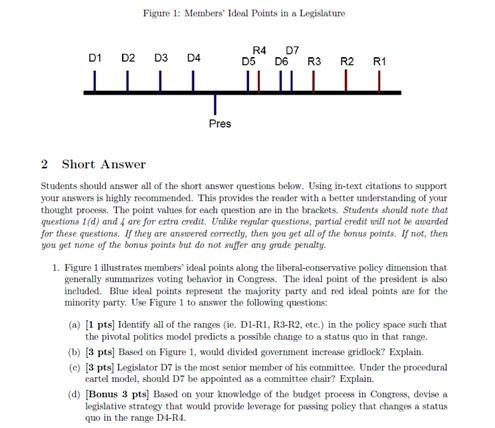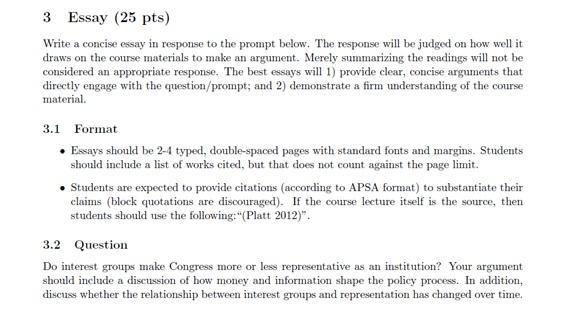Perhaps you've heard about the "Harvard Cheating Scandal" - of some 125 or so students caught cheating in the "Introduction to Congress" about 60 had to withdraw (see this Reuters article).
So let's take a look at what the exam was about (from thelastpsychiatrist.com):
At first blush its hard to tell what this test is about - certainly not about what Congress does.
Looks more like an introduction to influence lobbying.
And what's this "pivotal politics model" they describe in the Short Answers section?
It appears, from this, to be some sort of rehashed, long winded liberal academic game theory that describes how voting and voting blocs affect the outcome of Congressional votes. A social science version of combination some third grade mathematics and standard, decades old game theory.
Basically the idea is how do you determine what would be required to "get the vote through" - how do you manipulate the fewest and weakest to get what you want.
The mathematics of this was well founded well back into the 1940's.
This is all basically nonsense seeing how most people taking this course would very likely not be able to tell you (even after this class given the questions) anything current about the US Congress - who the leaders are, how many members, what they do, how they vote, what they are currently voting on, and so on.
The test was a "take home" so more than likely cheating would occur (most universities have figured out that unless you conduct the test in a room with a proctor cheating will occur). I guess they are not to clever at Harvard.
The test also requires the students to list sources (citations) for their answers in the various texts provided by the professor - so how much variety can you really expect?
More than likely turnitin was used to figure out who the "cheaters" were.
How original is that?
Simply relying on a program to tell them who's cheating.
(I would be willing to bet that a narrow enough exam would cause this to trigger for cheating even if there weren't any, e.g., what's the "Similarity Index" for cheating versus a badly written or simple-answer test where all the answers would be identical anyway... but that's probably another story...)
The thelastpsychiatrist claims that the test mostly looks for students to regurgitate answers from what the professors give them as opposed to doing their work on their own. He asks how much do they "learn" out side of what the professor tells them.
I would think that clever students would simply purchase a copy of turnitin and devise their own program to take the facts the test requires and generate a set of answer sheets that were unique and guaranteed not to trigger turnitin.
So the bottom line is
- The course content probably teaches nothing but how to influence you Congressman.
- It would be interesting to find out how many students in the class could tell you facts about the US House.
- The "pivotal politics" model is clearly social non-science that just rehashes mathematical game theory into something useless for third graders.
- To determine plagerism in a complex answer test across 125 test (lets assume out of a population of at least 150) no doubt requires a program - so how reliable is the program?
- How well written is the test to encourage diverse enough answers so that non-cheating students wouldn't get caught?
- This is our "best and brightest" - supposedly. You'd think if they were going to cheat they'd at least do a good job - but they didn't?
Why?
This last point is the most interesting. Here you are paying probably $40K a year to attend a school and you are lazy or stupid and don't think you can pass the exam.
So you cheat in a blatant and obvious way.
How clever is that?
You'd think that you'd at least bother to ensure your answers weren't exactly like everyone all those of all your classmates.
No wonder the country is going down the tubes.
So let's take a look at what the exam was about (from thelastpsychiatrist.com):
At first blush its hard to tell what this test is about - certainly not about what Congress does.
Looks more like an introduction to influence lobbying.
And what's this "pivotal politics model" they describe in the Short Answers section?
It appears, from this, to be some sort of rehashed, long winded liberal academic game theory that describes how voting and voting blocs affect the outcome of Congressional votes. A social science version of combination some third grade mathematics and standard, decades old game theory.
Basically the idea is how do you determine what would be required to "get the vote through" - how do you manipulate the fewest and weakest to get what you want.
The mathematics of this was well founded well back into the 1940's.
This is all basically nonsense seeing how most people taking this course would very likely not be able to tell you (even after this class given the questions) anything current about the US Congress - who the leaders are, how many members, what they do, how they vote, what they are currently voting on, and so on.
The test was a "take home" so more than likely cheating would occur (most universities have figured out that unless you conduct the test in a room with a proctor cheating will occur). I guess they are not to clever at Harvard.
The test also requires the students to list sources (citations) for their answers in the various texts provided by the professor - so how much variety can you really expect?
More than likely turnitin was used to figure out who the "cheaters" were.
How original is that?
Simply relying on a program to tell them who's cheating.
(I would be willing to bet that a narrow enough exam would cause this to trigger for cheating even if there weren't any, e.g., what's the "Similarity Index" for cheating versus a badly written or simple-answer test where all the answers would be identical anyway... but that's probably another story...)
The thelastpsychiatrist claims that the test mostly looks for students to regurgitate answers from what the professors give them as opposed to doing their work on their own. He asks how much do they "learn" out side of what the professor tells them.
I would think that clever students would simply purchase a copy of turnitin and devise their own program to take the facts the test requires and generate a set of answer sheets that were unique and guaranteed not to trigger turnitin.
So the bottom line is
- The course content probably teaches nothing but how to influence you Congressman.
- It would be interesting to find out how many students in the class could tell you facts about the US House.
- The "pivotal politics" model is clearly social non-science that just rehashes mathematical game theory into something useless for third graders.
- To determine plagerism in a complex answer test across 125 test (lets assume out of a population of at least 150) no doubt requires a program - so how reliable is the program?
- How well written is the test to encourage diverse enough answers so that non-cheating students wouldn't get caught?
- This is our "best and brightest" - supposedly. You'd think if they were going to cheat they'd at least do a good job - but they didn't?
Why?
This last point is the most interesting. Here you are paying probably $40K a year to attend a school and you are lazy or stupid and don't think you can pass the exam.
So you cheat in a blatant and obvious way.
How clever is that?
You'd think that you'd at least bother to ensure your answers weren't exactly like everyone all those of all your classmates.
No wonder the country is going down the tubes.



No comments:
Post a Comment